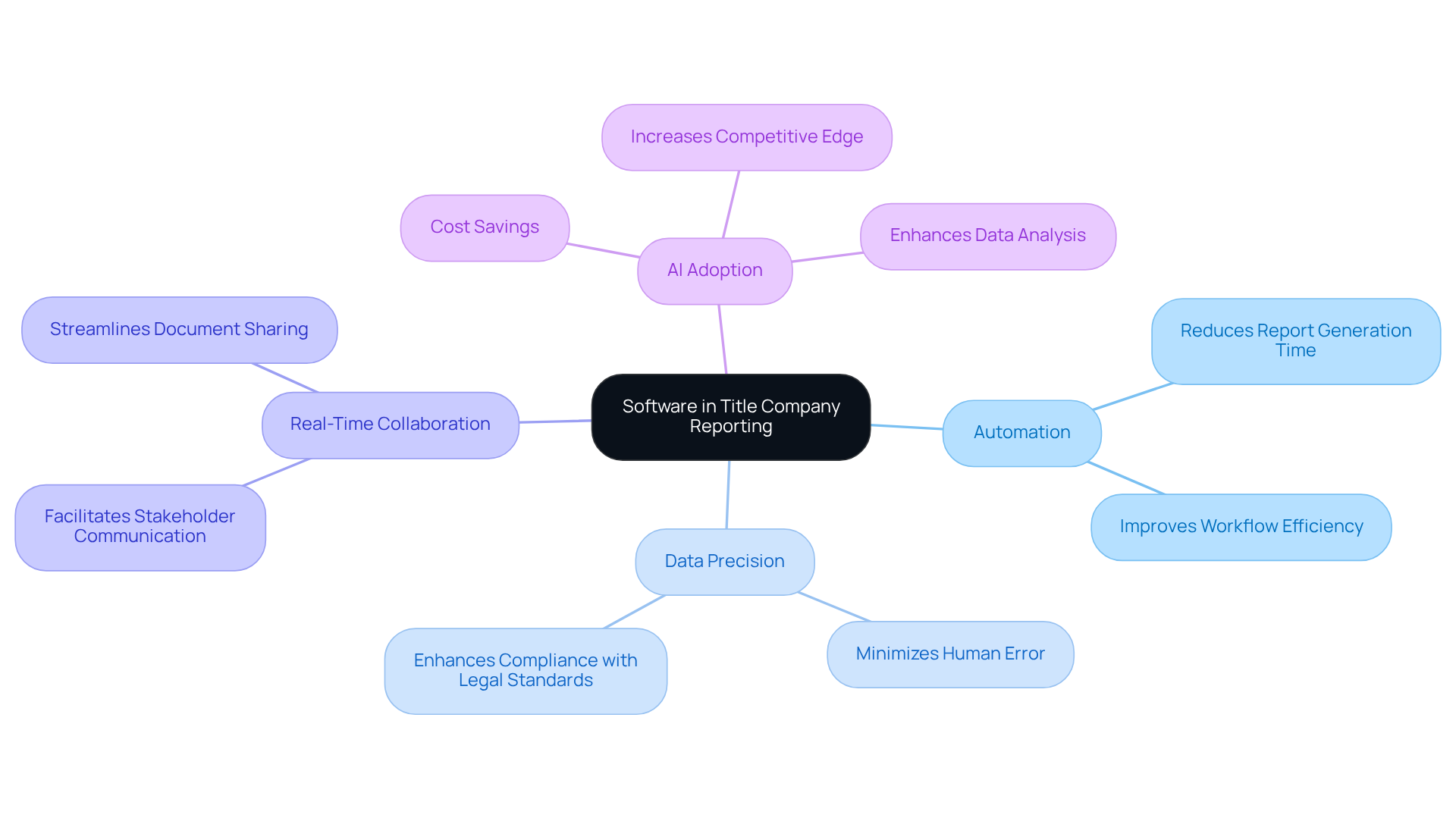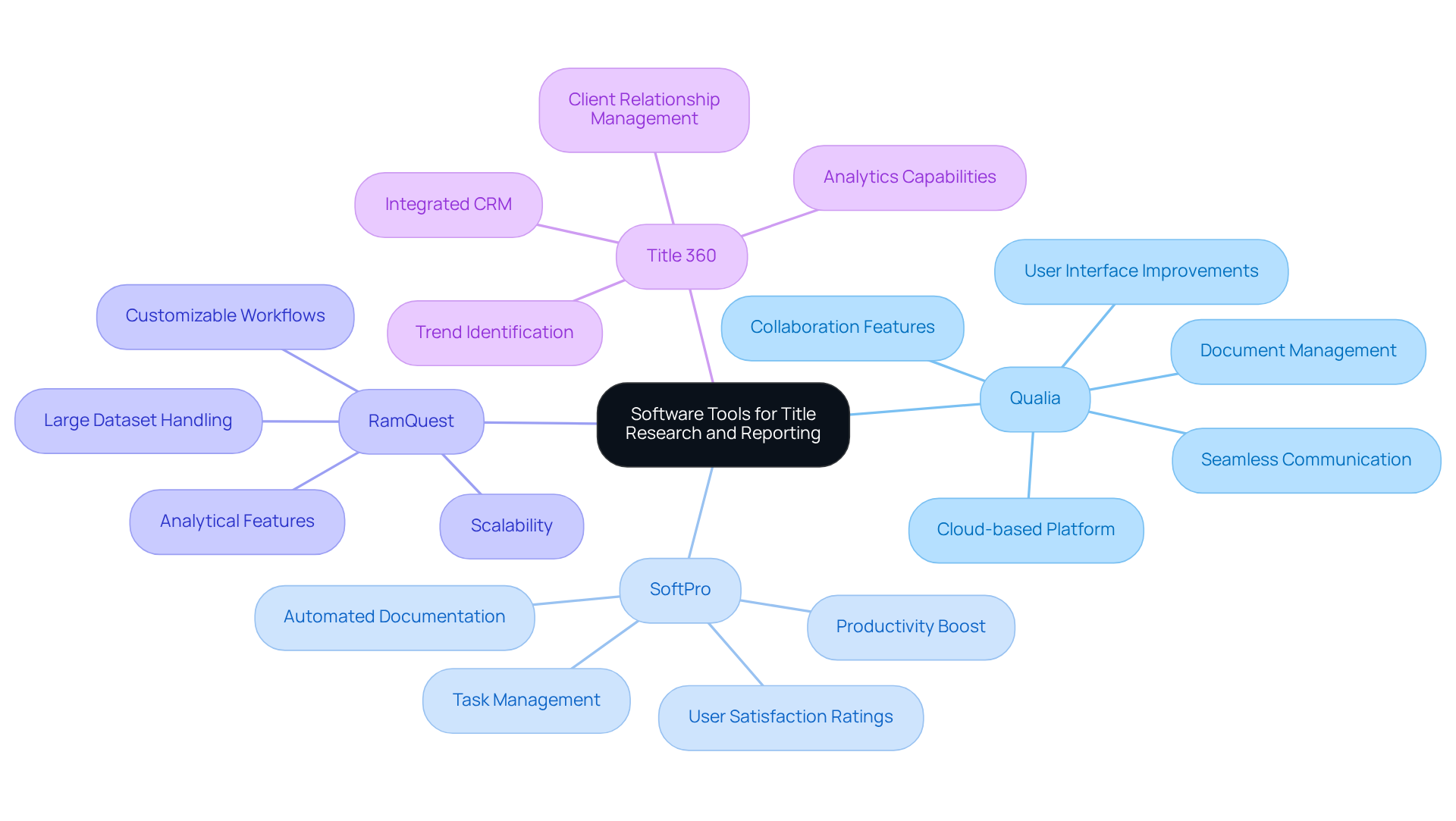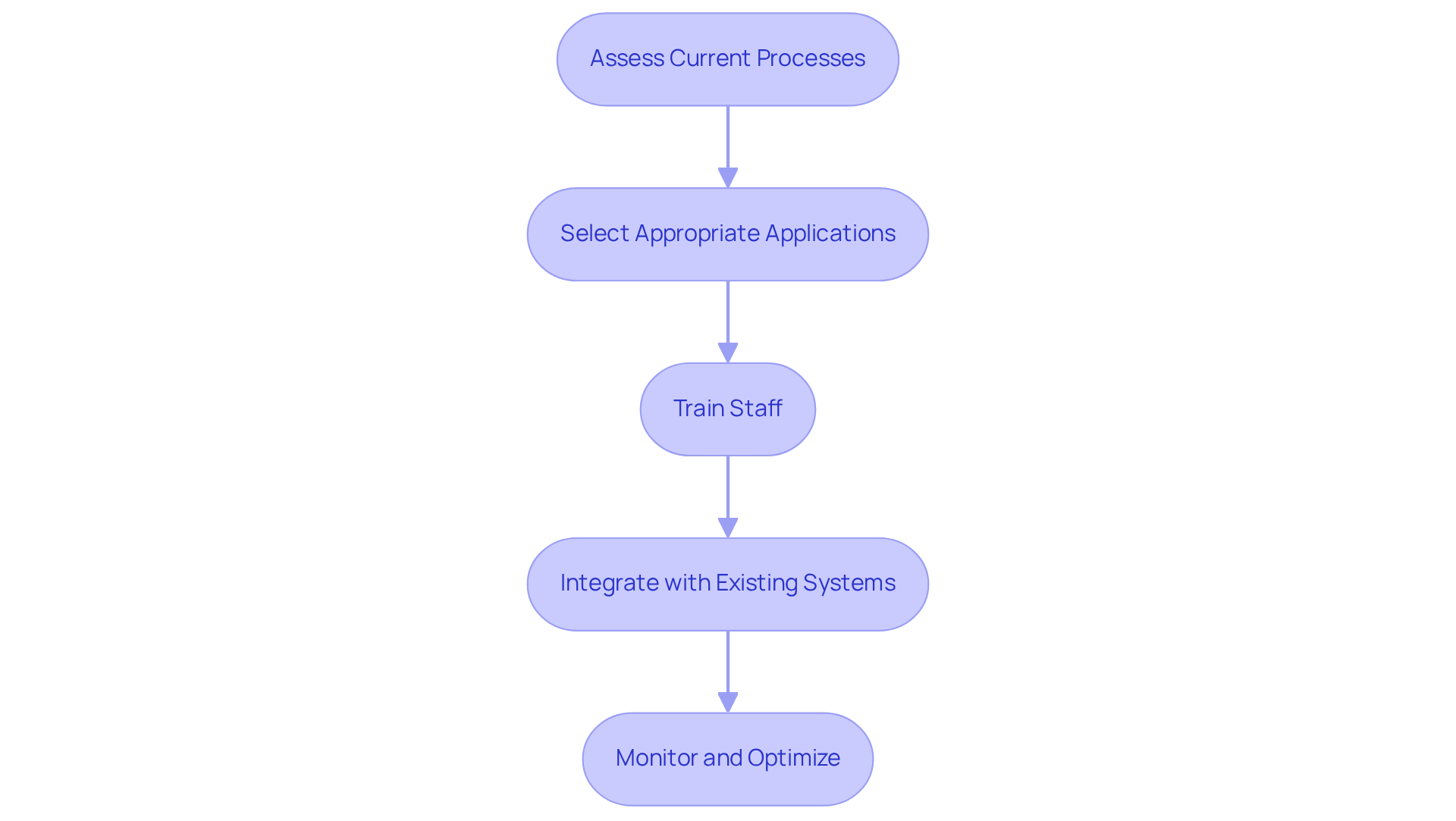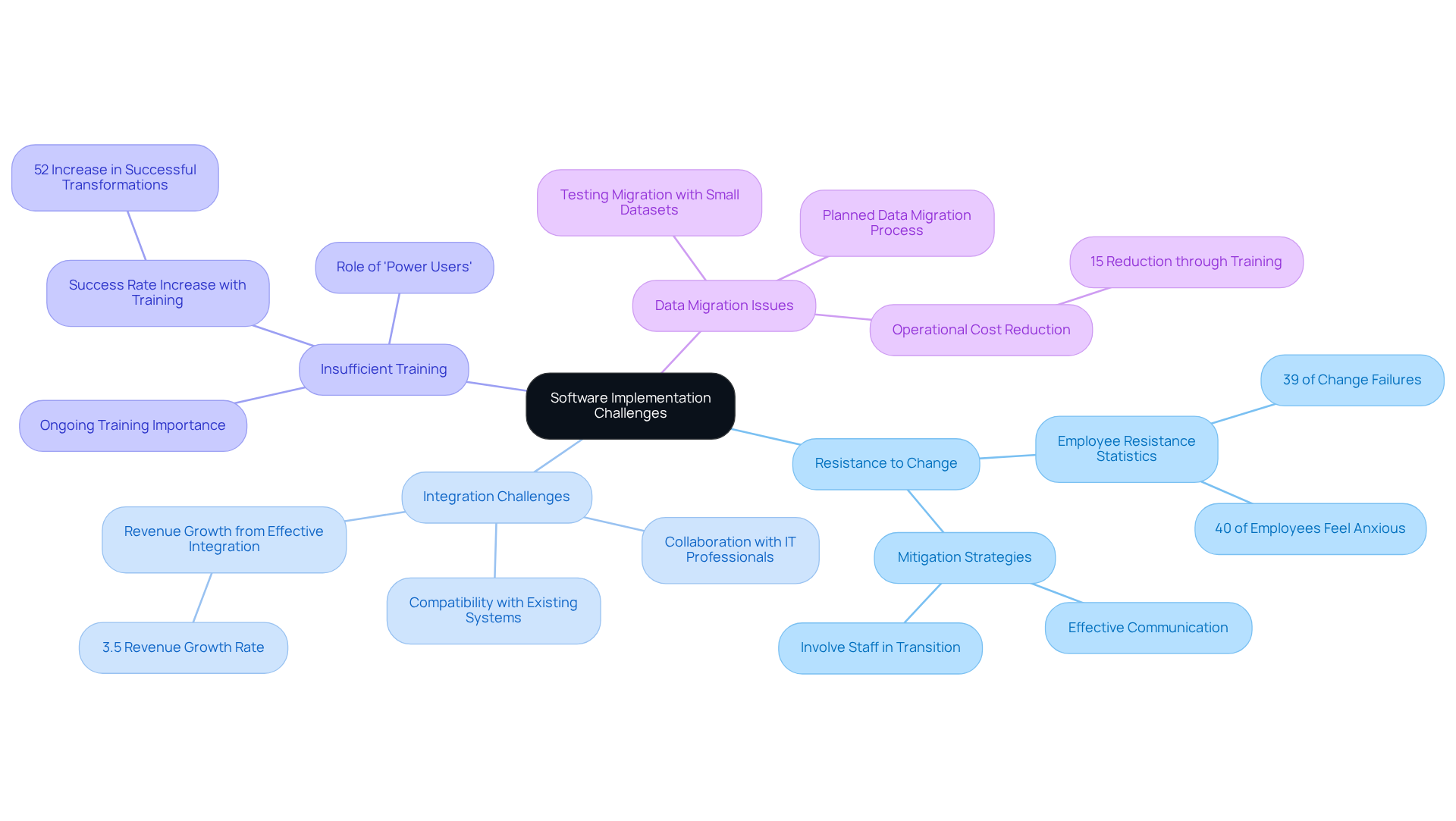Overview
Software significantly enhances title company reporting efficiency by automating repetitive tasks, improving data accuracy, and facilitating real-time collaboration among stakeholders. This article underscores the importance of accurate title research and addresses the challenges faced in the industry.
Technologies such as AI and machine learning streamline documentation processes, reduce report generation time, and ultimately lead to increased operational efficiency and compliance with legal standards. Consequently, the adoption of these technologies is not just beneficial but essential for modern title companies aiming to maintain a competitive edge.
Introduction
Software is revolutionizing the way title companies manage their reporting processes, ushering in a new era of efficiency and accuracy. By automating tedious tasks and enhancing data analysis, these technological advancements not only streamline operations but also significantly reduce the risk of human error.
Furthermore, as the industry rapidly evolves, the question remains: how can title companies effectively adopt these innovations to stay competitive and meet the growing demands of the real estate market?
Understand the Role of Software in Title Company Reporting
Software is fundamentally transforming documentation processes, demonstrating how software improves title company reporting by automating repetitive tasks, enhancing data precision, and facilitating real-time collaboration among stakeholders. By leveraging machine learning and optical character recognition, title firms can swiftly extract and analyze data from extensive title documents, illustrating how software improves title company reporting by drastically reducing report generation time. This technological advancement illustrates how software improves title company reporting by boosting operational efficiency and mitigating the risk of human error, thereby ensuring compliance with legal standards.
As noted by industry leaders, the incorporation of AI in documentation processes is not merely a trend; it is a requirement for remaining competitive. For instance, early adopters of AI report that approximately 97% of their investments yield returns when scaled into full projects. Furthermore, case studies demonstrate that companies leveraging these technologies experience significant cost savings and improved workflow efficiency. Notably, 33% of mid-market firms have implemented limited AI use cases, underscoring the current landscape of AI adoption in the industry. Additionally, McKinsey estimates a $4.4 trillion productivity boost from AI in the coming years, reinforcing the importance of these technologies.
Grasping how software improves title company reporting is essential for professionals in the industry who aim to enhance their documentation methods and meet the evolving requirements of the real estate market. Parse AI's commitment to continuous improvement and collaboration with land service professionals further exemplifies the dedication necessary to address industry challenges.

Explore Key Software Tools for Title Research and Reporting
Multiple software tools are essential in illustrating how software improves title company reporting and enhances research efficiency. Notable examples include:
-
Qualia: A cloud-based platform that integrates title and escrow processes, allowing for seamless communication and document management. Recent updates have improved its user interface and enhanced collaboration features, making it a preferred option for many industry professionals. According to industry reports, North America accounted for over 41% of the global software market revenue in 2024, highlighting the growing reliance on such platforms.
-
SoftPro: This tool provides extensive production solutions with functionalities for automated documentation and task management. User satisfaction ratings indicate that professionals using SoftPro experience significant boosts in productivity and precision in production, with testimonials commending its effectiveness in streamlining workflows.
-
RamQuest: Recognized for its scalability and strong analytical features, RamQuest is suitable for both small and large title companies. Its flexibility allows users to customize workflows according to their specific needs, thereby enhancing overall operational efficiency. The software's capability to handle large datasets and navigate complex workflows is particularly beneficial in today's fast-paced environment.
-
Title 360: This platform offers a completely integrated CRM that improves client relationship management and analytics capabilities. Its analytics tools illustrate how software improves title company reporting by enabling organizations to identify trends and areas for enhancement in their reporting processes. As highlighted in various case studies, platforms like Title 360 can significantly enhance client satisfaction by providing timely insights and improving communication.
These tools not only enhance workflows but also provide valuable insights into how software improves title company reporting, assisting companies in optimizing their operations and increasing client satisfaction. Furthermore, integrating AI agents, as demonstrated in Riverside Title & Escrow's application, can further improve efficiency by enabling experts to devote more time to client communication and intricate issue resolution.

Implement Software Solutions for Streamlined Reporting Processes
To effectively implement software solutions in title research, consider the following steps:
-
Assess Current Processes: Begin by evaluating existing reporting workflows to pinpoint bottlenecks and inefficiencies. This assessment is crucial, as nearly 88% of workers admit to procrastinating at least an hour daily, indicating potential areas for improvement.
-
Select Appropriate Applications: Choose applications that meet your specific needs, focusing on scalability, user-friendliness, and integration capabilities. The appropriate applications can greatly boost productivity, with research indicating that organizations utilizing time monitoring tools can enhance project planning and resource distribution. Furthermore, utilizing time tracking applications can save a company with 50 employees more than $18,000 annually on processing costs, emphasizing the financial advantages of effective technological solutions.
-
Train Staff: Provide comprehensive training for employees to ensure they are comfortable with the new system and fully understand its features. Effective training can lead to increased employee engagement, as workers feel more valued when they can track their contributions to project success.
-
Integrate with Existing Systems: Ensure that the new application integrates seamlessly with current systems to prevent operational disruptions. This integration is vital for maintaining workflow continuity and maximizing efficiency.
-
Monitor and Optimize: After implementation, continuously monitor the software's performance and gather user feedback to make necessary adjustments. As W. Edwards Deming stated, "Without data, you're just another person with an opinion," highlighting the significance of data-driven decision-making in enhancing documentation processes. This iterative process is essential for optimizing workflows and improving accuracy in analysis.
By following these steps, firms can significantly enhance their reporting processes, illustrating how software improves title company reporting and leading to improved efficiency and precision. Successful system integration not only streamlines operations but also enables organizations to adjust to evolving market needs effectively.

Troubleshoot Common Issues in Title Company Software Implementation
Introducing new applications in title companies presents several challenges that can impede the anticipated efficiency improvements. To address these common issues, key strategies must be implemented:
-
Resistance to Change: Mitigating employee resistance is crucial; thus, it is imperative to communicate the advantages of the new software clearly. Research reveals that 39% of change failures stem from employee resistance, emphasizing the need to confront this issue directly. Involving staff in the transition process fosters a sense of ownership and alleviates anxiety. Organizations with effective communication strategies witness an 85% increase in employee engagement, significantly enhancing buy-in during system changes.
-
Integration Challenges: Ensuring compatibility with existing systems is vital for a seamless transition. Collaborating closely with IT professionals to swiftly address any integration issues is essential. Companies that excel in managing change report a 3.5% revenue growth rate, highlighting the financial benefits of effective integration. Furthermore, maintaining effective communication during this phase can enhance employee engagement and facilitate smoother integration.
-
Insufficient Training: Ongoing training is indispensable for staff to achieve proficiency in the new system. Providing resources and appointing 'power users' can promote knowledge sharing and support among team members. Organizations with dedicated change management teams experience a 52% increase in successful transformations, underscoring the critical role of training in the implementation process.
-
Data Migration Issues: A meticulously planned data migration process is paramount to avoid the loss of essential information. Testing the migration with a small dataset prior to full implementation can help identify potential issues early. Investing in employee training can reduce operational costs by 15%, thereby demonstrating the value of careful planning in data migration.
By proactively addressing these challenges, title companies can facilitate a smoother software implementation process, demonstrating how software improves title company reporting while enhancing their reporting efficiency and overall operational effectiveness.

Conclusion
Software is revolutionizing the way title companies approach their reporting processes, underscoring its essential role in enhancing efficiency and accuracy. By automating repetitive tasks, improving data precision, and fostering real-time collaboration, software solutions are indispensable for firms striving to remain competitive in a rapidly evolving market. The integration of advanced technologies like AI and machine learning further emphasizes the necessity of these tools, enabling companies to streamline operations and mitigate the risk of human error.
Key arguments throughout the article illustrate how specific software tools, such as Qualia, SoftPro, RamQuest, and Title 360, significantly contribute to operational efficiency. These platforms not only facilitate improved communication and document management but also provide valuable insights that enhance client satisfaction and reporting accuracy. The outlined steps for implementing these tools—assessing current processes, selecting appropriate applications, training staff, ensuring integration, and monitoring performance—serve as a strategic roadmap for firms seeking to optimize their reporting methodologies.
The implications of adopting software solutions extend beyond immediate operational enhancements; they signify a strategic move toward future-proofing title companies against industry challenges. Embracing technology is not merely an option but a necessity for firms that aspire to thrive in a competitive landscape. By investing in software solutions and proactively addressing common implementation challenges, title companies can unlock significant efficiencies and position themselves for sustainable growth.
Frequently Asked Questions
How is software transforming title company reporting?
Software is transforming title company reporting by automating repetitive tasks, enhancing data precision, and facilitating real-time collaboration among stakeholders.
What technologies are mentioned as beneficial for title firms?
Machine learning and optical character recognition are mentioned as technologies that help title firms swiftly extract and analyze data from extensive title documents.
What are the benefits of using software in title company reporting?
The benefits include drastically reduced report generation time, boosted operational efficiency, minimized risk of human error, and ensured compliance with legal standards.
Why is the incorporation of AI in documentation processes important?
The incorporation of AI is important because it is necessary for remaining competitive in the industry, with early adopters reporting significant returns on their investments.
What evidence supports the effectiveness of AI in the title industry?
Case studies show that companies leveraging AI technologies experience significant cost savings and improved workflow efficiency, with a McKinsey estimate of a $4.4 trillion productivity boost from AI in the coming years.
What percentage of mid-market firms have implemented AI use cases?
Approximately 33% of mid-market firms have implemented limited AI use cases.
Why is it important for professionals in the title industry to understand how software improves reporting?
Understanding how software improves title company reporting is essential for professionals to enhance their documentation methods and meet the evolving requirements of the real estate market.




